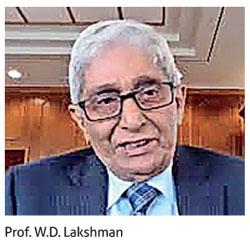Reply To:
Name - Reply Comment
By Nishel Fernando
While acknowledging that Sri Lanka will have to undergo a period of austerity under the government’s alternative policy approach to break out from the debt trap, the Central Bank (CB) suspects a possible link between the recently published “damaging reports” on Sri Lanka’s external sector by certain institutions with the events taking place at the UN Human Rights Council (UNHRC) on Sri Lanka in Geneva.

“In the last couple of weeks alone, three institutions, Standard Charted, Barclay’s, and ICRA published damaging reports about a possible default. It’s no coincidence that these three reports came one after another during a period when one of the international events affecting Sri Lanka was taking place in Geneva, the UN Human Rights Council meeting. I think it is no coincidence that these two coincide,” CB Governor, Prof. W.D. Lakshman opined on Wednesday at a webinar organised by Veemansa Initiative.
He blamed financial analysts for solely relying on Modern Monetary Economic theory in arriving with their “doom and gloom” predictions while discarding government’s alternative policy approach.
“These ideas are not limited to Modern Monetary Economic theory, these are the ideas even debated centuries ago,” he said.
Further, condemning such “doomsday” predictions, he claimed that these forecasts were aimed at directly or indirectly pushing the country to seek International Monetary Fund (IMF) involvement again in the economic policymaking.
“What those forecastsers want, either directly or indirectly, is to push Sri Lanka to seek IMF involvement again in our economic policy making. In all historical episodes of a move from foreign reserve inadequacy to adequacy, it was through a period of some austerity, in particular, through some import restrictions, that we could achieve the said results,” he added.
He pointed out that the interest cost on international sovereign bond(ISB) issuances peaked to US$ 1 billion per annum in 2019, due to the rapid build in ISB issuance during 2015-2019. Hence, he stressed that curtailing of foreign debt has become a key policy of the current government.
He highlighted that the government aims to phase out foreign debt component from current 43 percent to 33 percent in the country’s overall debt portfolio in the mid-term and to record a surplus in the current of Balance of Payments (BoP), by mainly tapping into non-debt creating financial instruments.
He stressed that import substitutions and export promotion to be the key elements in this approach,
“This will no doubt require some austerity, in terms of mostly cutting down non-essential consumer imports and a systematic effort in enhancing all forms of foreign currency inflows,” Prof. Lakshman said.
Further, expediting the legislation process of the Colombo Port City development and the development of the Hambantota Industrial Zone, CB expects a healthy flow of FDI to the country from the second half of this year.
Due to the policies implemented so far, he predicted that the country is likely to record a surplus in the current account for the first time since 1977.
“Sri Lanka recorded a current account surplus in 1977 for the last time, it was not due to open-economic policies, but due to earlier period of austerity adopted by 1970-1977 government,” he added.
Meanwhile, revealing figures on external debt service payments based on domestic nature of the creditor, the Governor emphasized that the government has already serviced large chunk of its external debt obligations for the year.
“We had to pay back as the principal and interest on external debt, a sum of US$ 4,321 million in 2020. In 2021, total external debt service payments amount to US$ 3,709 million. Of this US$ 1,103 million has already been repaid in January-February. During the rest of the year, we have to pay on external debt service a sum of US$ 3,227 million. Similar external debt service payments are due from 2022-2025,” he said.
However, the government also has US$ 1.3 billion of US dollar denominated Sri Lanka Development Bond (SLDB) maturities this year.
Although, the country’s gross foreign exchange reveres fell to a record-low of US $ 4.8 billion at the end of January from US$ 5.6 billion at the end last year and US $ 7.6 billion at the end 2019, he assured that the measures are in place to build up reveres focusing on non-debt creating instruments.
Accordingly, he noted that CB started purchasing US$ 10 million on average daily in the foreign exchange market since mid part of this month after selling US$ 72 million in defending the rupee in January.
Further, CB also purchased around US$ 20 million since February 9 from inflows conversion of workers’ remittances through commercial banks.
With its recent order on exporters to convert 25 percent of their export proceeding immediately to rupees, the CB plans to purchase 50 percent of export proceeds converted into rupees by exporters amounting to 12.5 percent of total foreign exchange earnings.
The government is also in active negotiations with a number of bilateral and multilateral lending institutions and overseas central banks and governments to obtain financing facilities.
“We are expecting some of these on-going negotiations to materialize within a matter of a few weeks,” he said.
With the US$ 1 billion ISB to be largest chunk of debt service scheduled in 2021, the Governor said that CB is fully confident of meeting this ISB payment as well all other external as well as domestic debt obligations.
In the long-term, he said that current policy approach would support the country to become a net creditor with gross foreign exchange reserves surpassing external debt obligations.